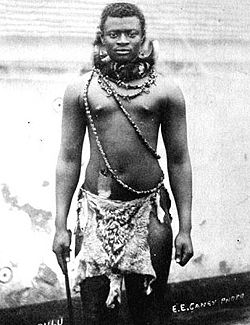Dinizulu
| Dinuzulu kaCetshwayo | |
|---|---|

Photo of Dinuzulu, c.1883
|
|
| Reign | 20 May 1884 – 18 October 1913 |
| Born | ca. 1868 |
| Died | 18 October 1913 Transvaal |
| Spouse | None |
| Issue | Solomon kaDinuzulu |
| Occupation | Monarch of the Zulu Kingdom |
Dinuzulu kaCetshwayo (1868 – 18 October 1913, commonly misspelled Dinizulu) was the king of the Zulu nation from 20 May 1884 until his death in 1913. He succeeded his father Cetshwayo, who was the last king of the Zulus to be officially recognized as such by the British. Zululand had been broken up into 13 smaller territories by the British after the Anglo-Zulu War, and Cetshwayo, and subsequently Dinuzulu, administered one of them. The British later realized the futility of breaking up Zululand into the territories and restored Cetshwayo as paramount leader of the territories. However, they left one of Cetshwayo's sons, Usibepu (Zibhebhu), alone with his lands intact. On 22 July 1883, Usibepu attacked Cetshwayo's new kraal in Ulundi, wounding the king and causing him to flee.
To contest the succession, Dinuzulu first appealed to the British, but had no response. He then offered rewards of land to Boer farmers of the Vryheid and Utrecht districts, to come and fight on his side and restore the Zulu Kingdom. In 1884 a group of Boer farmers from the districts of Utrecht and Vryheid undertook to help restore order, in return for land for the formation of an independent republic with access to the sea. Led by General Louis Botha, they formed Dinuzulu's Volunteers and after several clashes with Zibhebhu, defeated him at the Battle of Ghost Mountain (also known as the Battle of Tshaneni) on 5 June 1884.
The Nieuwe Republiek, established in northern Natal on land awarded to Boers by Dinuzulu, was recognized by Germany and Portugal. It was later incorporated on its request by the ZAR because of financial problems, after the British annexed the coastal plains from the Thuhela river (Tugela) northwards in order to prevent the Boers from building a harbor. After considerable dispute in a Natal arbitration court, Britain eventually recognized the New Republic, but reduced in size after annexation of the coastal plains by Britain and deprived of its claims to St Lucia for a harbor. The Niewe Republiek was incorporated on its own request with the Zuid Afrikaanse Republiek in 1888. Stability in the Zulu kingdom continued until the British annexed the Zuid Afrikaanse Republiek in 1899.
...
Wikipedia
